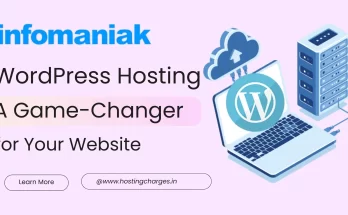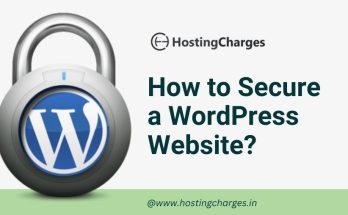WordPress.com and WordPress.org might share the same name, but they’re two completely different platforms. Many beginners get confused and end up picking the wrong one for their needs. Even if you’ve heard of both, understanding how they differ is key to making the right choice.
In this blog, we’ll break down the key differences between WordPress.com and WordPress.org so you can confidently choose the best platform for your website.
WordPress.com vs. WordPress.org: Key Differences
What is WordPress.org?
WordPress.org, often called “the real WordPress,” is the powerful platform behind many popular websites. It powers over 43% of all websites, making it the most popular and trusted platform for building any type of site.
WordPress.org is an open-source software that’s completely free to download and use. You’ll need to get your own domain name and hosting to use WordPress.org, which is why it’s called self-hosted WordPress.
Supported by The WordPress Foundation, it offers complete control over your website. You can install themes, add plugins, and customize everything to fit your needs. While the software itself is free, you’ll need to pay for hosting from providers like A2 Hosting and Kinsta.
If you’re looking for flexibility and independence to build a website your way, WordPress.org is the go-to option. It’s perfect for anyone who wants total control over their site’s design and functionality.
See our below guides, to create a website or blog using WordPress.org, the RIGHT way.
- How to Start a Blog or Website with WordPress (Beginner’s Guide)
- Do You Blog? Consider WordPress Web Hosting
- How to create an Ecommerce website with WordPress: The Ultimate Guide!!!
- How to Secure a WordPress Website?
Pros
- You have full control over your website and data, ensuring complete ownership without the risk of your site being taken down unless it violates the law.
- The WordPress software is free and open-source, allowing you to build a professional site without software costs.
- It offers unlimited customization options with access to thousands of free and premium themes, or you can design your own to match your vision.
- You can enhance your website’s functionality by adding free, paid, or custom plugins, making it adaptable to your specific needs.
- WordPress.org allows you to monetize your website freely. You can run ads, create paywalls, or sell products without sharing revenue or facing restrictions.
- It’s an excellent platform for building eCommerce stores. Using WooCommerce, you can sell digital or physical products, accept payments, manage inventory, and handle shipping directly from your website.
- Membership site creation is seamless, enabling you to sell premium content, online courses, or exclusive community access to users.
- The platform gives you the flexibility to choose any third-party hosting provider that meets your requirements and budget, providing scalability and control.
- You can use advanced analytics tools like Google Analytics to track website performance and understand user behavior in detail.
- WordPress.org supports open development, allowing you to modify your site’s code to achieve unique designs and functionalities.
- There are no content limitations or restrictions, so you can publish and share anything you want without adhering to strict terms of service.
- The platform is ideal for users seeking total freedom, as it lets you create exactly the website you envision without compromise.
Cons
- You’re responsible for updates and backups, though plugins can simplify these tasks.
- Hosting costs start at $3–$10 per month and may increase as your site grows.
- Choosing the right hosting provider can take time and research.
- Advanced customization or troubleshooting might need web development knowledge or professional help.
- Installing WordPress requires some manual effort, but many hosts offer one-click installation.
- Security management, including SSL certificates and plugins, is entirely up to you.
- Customization requires learning to use plugins, themes, and possibly code.
What is WordPress.com?
WordPress.com is a hosting platform that lets you create a website without worrying about technical setups. Unlike WordPress.org, where you need to self-host and manage your site, WordPress.com handles everything for you—from hosting to updates. You just sign up, pick a template, and get started with a free yoursite.wordpress.com URL.
It’s run by Automattic, the company led by WordPress co-founder Matt Mullenweg. Due to the similar names, many people mistake WordPress.com for the self-hosted WordPress.org software.
The platform offers a range of plans to fit different needs:
- Free: Basic features with major limitations.
- Starter: $48/year, good for personal sites.
- Explorer: $96/year, adds more flexibility.
- Creator: $300/year, ideal for small businesses.
- Entrepreneur: $540/year, best for eCommerce with WooCommerce.
- VIP: Starts at $25,000/year for large-scale enterprises.
WordPress.com is a great choice if you want a hands-off, beginner-friendly solution. However, it comes with fewer customization options compared to WordPress.org, which is something to keep in mind if you’re planning to grow or scale your site.
Pros
- WordPress.com is free to start, offering an easy entry point with no upfront costs. It provides 3GB of storage, making it ideal for hobbyists or beginners.
- The platform manages all updates, backups, and security for you, so you can focus entirely on your content without worrying about maintenance.
- Hosting is included and top-notch, ensuring your site remains stable and secure without additional hosting fees.
- The setup process is quick and straightforward—pick a name, theme, and URL, and you can start publishing right away.
- Free plan users benefit from pre-installed Jetpack features, offering basic performance, analytics, and security tools.
- Paid plans provide scalability, unlocking features like premium themes, custom plugins, and advanced eCommerce tools, making it suitable for growing businesses.
- The Business and Commerce plans allow access to more customization and tools, including integration with payment gateways and enhanced storage options.
- WordPress.com is a hassle-free option for those who want a stable, managed website without dealing with technical details or additional costs upfront.
Cons
- Free sites display ads, and you don’t earn from them unless you upgrade
- You cannot upload custom plugins unless on higher plans like Creator ($300/year)
- Limited theme options, custom themes require an upgrade
- No access to Google Analytics or advanced tracking tools unless you upgrade
- Free sites use a WordPress.com subdomain, and custom domains require a paid plan
- Your site can be deleted if it violates their terms of service
- “Powered by WordPress.com” branding appears on free sites unless removed with an upgrade
- No eCommerce features or payment gateways without upgrading to premium plans
- Membership website functionality is not available
WordPress.com or WordPress.org: Which is Best for eCommerce?
When choosing between WordPress.com and WordPress.org for your eCommerce website, understanding their differences is key to finding the best fit for your needs.
WordPress.org is a self-hosted, open-source platform that provides exceptional flexibility and complete control. With the WooCommerce plugin, you can easily create a fully functional online store. WooCommerce is free to use and comes with features like:
- Selling physical and digital products
- Inventory and order management
- Multiple payment gateway integrations
- Extensive customization options
It also provides access to numerous free and premium extensions to further enhance your store. However, you’ll need to manage hosting, security, and backups yourself.
On the other hand, WordPress.com is a managed platform that takes care of hosting, security, and backups for you. Its eCommerce plan starts at $540 per year and includes:
- Built-in payment gateways
- Premium themes
- Marketing tools
- Integration with shipping carriers
While it’s convenient, WordPress.com has limitations, such as restricted customization and adherence to its terms of service.
If you want complete freedom, scalability, and customization, WordPress.org with WooCommerce is the better option, but it requires more hands-on management.
WordPress.com is a good choice if you want an easier setup with less to manage, but it comes at a higher cost and has some limitations.
Your decision ultimately depends on your business needs, technical skills, and budget.
Ideal Users of WordPress.com vs WordPress.org
Who Should Use WordPress.com?
WordPress.com is ideal for those who want a simple, no-maintenance way to get their content online. Its free version works well for hobby bloggers, journals, or anyone needing a temporary site without upfront costs.
It’s also a good choice for people running high-traffic, high-revenue businesses who want a hands-off experience. However, this applies mostly to those who can afford the VIP plans, starting at $2,000 per month, which are designed for large enterprises like Fortune 500 companies.
For most users, the free or affordable plans work best for straightforward blogging or minimal website needs.
Who Should Use WordPress.org?
WordPress.org is perfect for anyone who wants complete control over their website. Whether you’re creating a personal blog, a business website, an eCommerce store, or anything in between, WordPress.org gives you the tools and freedom to make it happen.
With full ownership of your site, design, and content, it’s an excellent choice for anyone who values customization and independence. While you’ll be responsible for managing your site, the flexibility and scalability make WordPress.org a top option for building virtually any type of website.
Can I Switch from WordPress.com to WordPress.org?
Yes, you can move your site from WordPress.com to WordPress.org. This transition allows you to gain more control over your website’s features and customization. Here’s a straightforward guide to walk you through the process:
- Export Your Content from WordPress.com: Log in to your WordPress.com account, navigate to Tools > Export, and choose to export all content. This will generate an XML file containing your posts, pages, and other data.
- Set Up Hosting and Install WordPress.org: Choose a reliable web hosting provider and install the WordPress.org software on your new hosting account. Many hosts offer one-click WordPress installations to simplify this step.
- Import Content to WordPress.org: Access your new WordPress.org site’s dashboard, go to Tools > Import, and install the WordPress importer. Use it to upload the XML file you exported earlier, bringing your content into the new site.
- Configure Permalinks and Settings: Adjust your permalink structure and other settings to match your previous site, ensuring consistency and preserving SEO rankings.
- Redirect Traffic (Optional): If you have an existing audience or want to maintain search engine rankings, set up redirects from your old WordPress.com site to the new WordPress.org site. This can be done by purchasing the Site Redirect upgrade from WordPress.com.
Following these steps will help you smoothly transition from WordPress.com to WordPress.org, giving you more control and flexibility for your website.
Final Thoughts
WordPress.org stands out as the better option for those who value freedom, flexibility, and full control over their website. While it requires managing hosting, updates, and backups, the benefits far outweigh the effort.
You can use any plugins or themes, customize every aspect of your site, and monetize without restrictions. If you’re ready to invest a little time for greater control, WordPress.org is the way to go.
FAQs
Is WordPress.org cheaper?
Yes, WordPress.org is generally cheaper in the long run. For around $70+/year, you can get a domain and hosting, unlocking all features without extra upgrade costs. Starting with WordPress.org right away is a smart move if you want full functionality and no hidden fees.
Can I learn WordPress in 3 days?
Yes, you can learn the basics of WordPress in just 2-3 days if you focus on key skills like creating pages, posts, and using themes or plugins. For advanced features, a WordPress bootcamp or consistent practice over a week or more is ideal. It ultimately depends on the time and effort you’re willing to put in.
Will WordPress pay me?
WordPress.com itself doesn’t pay you, but you can make money by using WordAds, their official advertising program. You’ll share ad revenue with WordPress.com, and higher plans give you more earning opportunities.
 Get Listed
Get Listed 

